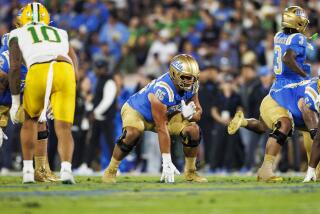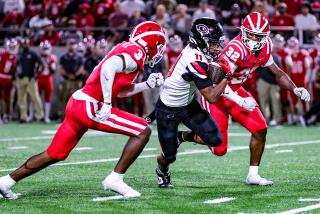Finally, He Saw the Light : Marine’s Bumpy Football Odyssey Completed at CLU
- Share via
THOUSAND OAKS — Cal Lutheran’s Pete Marine now sees through the glossy veneer of major college football, three years after accepting a scholarship to play wide receiver at Arizona State.
Then, he was a wide-eyed standout at Moorpark College, and the game was filled with vague, glamorous promises made by coaches--big-time Division I college coaches such as John Jenkins of the University of Houston--who sat in his living room and promised him an NFL career.
Now, for Pete Marine, playing football at Division III Cal Lutheran against schools he has never heard of is ultimately a means to an end: a college degree.
“When you’re young, coming out of high school or a junior college, you just see your name in lights, and you see the big Pac-10 and the big stadiums,” Marine said. “That Pac-10 thing--being able to come home and play USC and UCLA--really sold me. But now I see what’s more important for me. The thing now is graduating and getting my education. I think that came with age, and a little more maturity.”
That’s the thing about perspective. It hits you like a headhunting strong safety when you become a husband and a father by the time you’re 23.
And when you give up a full scholarship to Arizona State because you want to play somewhere rather than sit on the sidelines, but instead wind up working as a telephone operator while living at your parents’ Calabasas home with your wife and year-old daughter--well, catching a touchdown pass becomes somewhat less urgent than earning a degree.
“It definitely made school more of a priority,” he said.
Now a junior at Cal Lutheran, Marine’s academic statistics--he’s on track to graduate in 1995 in business administration--are as important as his impressive football numbers: 27 catches, 402 yards and three touchdowns in four games.
And the fact that he’s playing has filled an aching need.
“This is the happiest I’ve seen him in a long time,” said his father, Butch.
Marine’s journey to Cal Lutheran has been bumpy and circuitous. After graduating from Canoga Park High in 1988, he planned to play football at Valley College. But he decided against playing there after examining the Monarchs’ program, and instead sat out for a year and enrolled at Moorpark in the fall of 1989.
After two heady seasons as a Raider (55 receptions, 1,172 yards and 13 touchdowns), college recruiters threw all the tricks of the recruiting trade at Marine.
Jenkins, then-head coach at Houston, strode through the door of Marine’s Woodland Hills home wearing bright red cowboy boots and a matching cowboy hat, talking 100 yards a minute.
“He’s a crazy guy,” Marine said. “He was funny, cracking us up the whole night.”
Jenkins, the brash iconoclast known for his run-and-shoot offenses that piled up gaudy statistics and notoriety in equal amounts, came armed with reams of statistics about the Cougar offense, led by quarterback David Klingler (now with the Cincinnati Bengals).
“He came with this whole book of stats and records,” Marine said. “He was saying how many catches I would have. He showed me all the stats for (former Cougar receiver) Manny Hazard and other guys.”
“Jenkins said, ‘You play here, you’ll go to the NFL.’ ”
Arizona State recruiters also gave him the hard sell. They served him dinner in the press box of 73,000-seat Sun Devil Stadium. And for dessert they flashed his picture and name on the stadium’s huge television replay screen.
“I was kind of star-struck,” he said. “That was definitely one of the things that got me there.”
Marine signed with Arizona State, ready to play Pac-10 football. He would let the home folks admire him against USC and UCLA, and then--who knows?--perhaps on to the NFL.
It was then that Marine’s football education truly began.
“When I went on my recruiting trip to Arizona State, I saw the 73,000-seat stadium,” Marine said. “I didn’t really see that only a few guys make it out of there, on to the pros. Everyone else is just a number, mixed in. There’s 100-some odd guys on the team, just sitting on the sidelines. Maybe one or two will get drafted and play in the pros.”
Marine was slated to start the home opener against Nebraska because Kevin Snyder, Arizona State’s first-string receiver, had a sprained ankle.
But on game day, Snyder decided he could play and Marine never set foot on the field. After he suited up for four contests, the staff decided to redshirt him.
Marine was told they had plans for him in the future, but after the season, Marmie and his coaching staff were fired and replaced by Bruce Snyder of California.
“Right after Bruce Snyder came in, I didn’t feel like they had much plans for me there,” he said.
Marine also was frustrated with the sacrifices--academic and otherwise--imposed by football.
“You’re there on a scholarship and it’s like a business,” he said. “They make you feel like you owe them something. Your whole day is based on football and you do your homework and study on your free time--but there basically is no free time.”
Marine, who wanted to major in business, was placed in sociology by football-conscious advisers.
“I told them I wanted to be a business major,” he said. “But they would tell you, ‘Well, (business) is pretty tough. There’s a lot of football stuff that you have to do--a lot of practices, a lot of meetings. You wouldn’t want to take something that hard because it’ll just make it harder to get through.’ That kind of frustrated me because I wanted a degree that I felt I could do something with.”
Adding to the mix was the birth that February of his and wife Chirlaine’s daughter, Jordan.
After spring practice, Marine decided to leave Arizona State. His hopes were buoyed by the possibility of receiving a scholarship at Cal State Northridge and playing in front of family and friends.
Because the Matador program was in Division II, Marine would not lose a year of eligibility by transferring, as he would have had he transferred to a Division I school.
But a week and a half before fall camp started, Marine said Matador Coach Bob Burt called to inform him that no scholarships were available because of budget cuts.
Suddenly football was out of his life. Though he lived at home, he felt lost.
“You could see it,” Butch said. “Normally, he’d be sitting down here in the living room with his three other brothers watching football. Last year, he’d just get up after the first quarter and walk away. I didn’t ask him nothing because I knew. He missed it.”
Finally, Marine told his father what was on his mind.
“He said, ‘Dad, I want to get back in it,’ ” Butch said. “I said, ‘Hey, go for it.’ ”
Marine contacted Cal Lutheran assistant John Burton, whom he met while in high school.
The former Pac-10 player yearned to step on a football field--any field--and realized he needed a college degree. He was admitted to Cal Lutheran, which does not offer athletic scholarships, and when he received enough financial aid to cover nearly all of the costs of attending school, he joined the team.
His first game since 1990 was not televised or played in front of tens of thousands of people, but Azusa Pacific became the Nebraska that Marine never played against.
“Coming in before that first game against Azusa, I was more nervous than before any game,” he said. “I didn’t know what I still had in me.”
The 6-foot-0, 190-pounder still possessed big-play explosiveness, as evidenced by his fourth-quarter punt return for a touchdown that won the game. From the moment he stepped onto the field, he has been the primary offensive threat for Cal Lutheran (3-1, 1-1 in conference play).
“He’s come up with some big plays for us,” Coach Joe Harper said. “He has definitely made an impact.”
Marine had 11 catches for 117 yards and two touchdowns Saturday in Cal Lutheran’s victory over Menlo.
Cozy Mt. Clef Stadium (capacity 2,347) suffers in comparison to Sun Devil Stadium. And the adrenaline rush from playing in the Southern California Intercollegiate Athletic Conference isn’t as intense as in the Pac-10, which Marine freely admits. And misses.
“I miss the big stadium and all the fans,” he said “The excitement there of Division I is just incredible. You can feel it in your heart. The cheering goes right through you. But I was surprised how many people come out to these games here. They make a little noise.”
Marine now appreciates more than the noise.
“I think a lot of people get caught up in Division I, but some people just aren’t cut out for it,” he said. “I could have stayed at Arizona State and sat on the sidelines and gotten my education for free, but I felt I still wanted to play. I think I’m getting the better deal here--playing every day and getting a good education.”
More to Read
Get our high school sports newsletter
Prep Rally is devoted to the SoCal high school sports experience, bringing you scores, stories and a behind-the-scenes look at what makes prep sports so popular.
You may occasionally receive promotional content from the Los Angeles Times.






